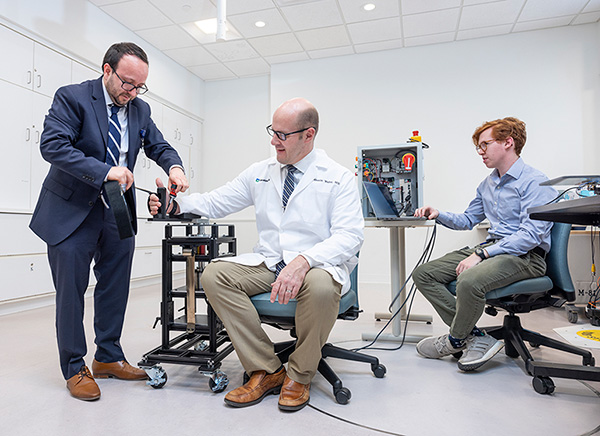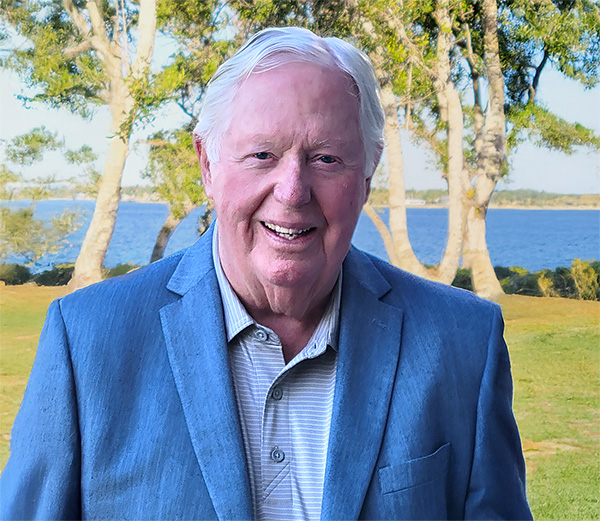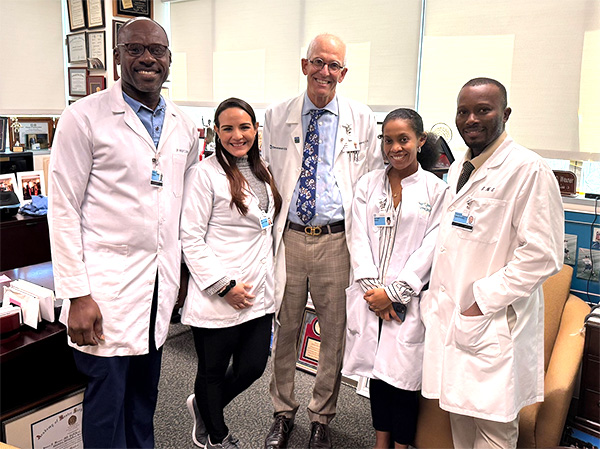A Quantitative Approach to Parkinson’s Disease

For some patients with Parkinson’s disease (PD), genetics may contribute to its development but in most cases, the cause is unknown. One hallmark of PD is body stiffening, causing a hunched posture and an altered gait. The disease also leads to tremors, slowed movements and balance problems.
Thanks to advances in treatment, many patients are able to manage these symptoms, either through medication or Deep Brain Stimulation (DBS) – a therapy in which an implanted electrode device delivers electricity to specific brain areas.
Much of today’s PD research focuses on determining ways to optimize medication and DBS treatments, looking at objective measures of motor signs and adjusting treatments. Neurologists use a five-point scale to gauge the movement of a patient’s arms and legs – zero is healthy, and four is severe. Although clinicians are highly trained, sometimes there is bias alongside day-to-day variability with patient fatigue.
Lightbulb Moment
David Escobar, PhD, director of the Neural Dynamics and Modulation Lab at Cleveland Clinic’s Lerner Research Institute, was in need of a device that could quantify the subtle changes in patients’ rigidity and a solution for assessing differences in current therapies and developing new approaches. There was nothing on the market like this, so he applied for a Catalyst Grant to develop the tool himself.
Catalyst Grants are funded annually by thousands of gifts of all sizes from donors. The competitive grants are awarded to caregivers with ideas to improve the lives of Cleveland Clinic patients, the organization and communities around the world.
Dr. Escobar and his team created a pair of robotic systems that can be placed on the wrist and elbow. Sensors measure how much torque is exerted with movement. That information is sent to their computer where algorithms determine the type of rigidity (stiffness vs. viscosity) and its degree with accuracy. Because of this quantitative approach, clinicians are better equipped to diagnose and treat this progressive disorder.
More Research Is Needed
PD is the second most common age-related degenerative brain disease, impacting many people. Dr. Escobar is motivated by this. His research on rigidity quantification is part of a larger program where he is developing techniques and technology to optimize DBS and narrow the variability of outcomes across patients.
One of his goals is to fully automate systems to pinpoint the exact location where devices must be placed and tune the DBS devices once they are implanted. The goal is to determine the optimal settings, timing and location to deliver electricity in each patient. Ultimately, he wants to reduce the DBS programming time and associated healthcare costs while providing the best DBS can offer.
His incredible research and innovative devices are only made possible because of donors. You can read more about our Catalyst Grant program and learn how your support can make a difference here.
Watch a video about Dr. Escobar's work here.
First a Gift, Then Care at Martin Health

Many people give to Cleveland Clinic because they or a loved one received care at one of our facilities. Not James O’Hare—at least, not at first.
O’Hare, who’s 86 years old and lives in Palm City, Florida, began supporting Cleveland Clinic at the urging of his neighbors, becoming a donor at the Barstow-Reed Society level at Cleveland Clinic Martin Health. As the only nonprofit hospital system in the Treasure Coast, philanthropic support is vital to the hospital’s ability to provide world-class care in the community.
He reminisces with gratitude about preparations for a three-month trip to New Zealand a few years ago. When he asked for help scheduling a complete cardiac health work-up ahead of the trip, his healthcare team was able to schedule all the necessary appointments for the same day, saving time and frustration.
“I was convinced then that as long as I’m alive, I should continue to give to the hospital,” he says.
Supporting Areas of Greatest Need
Because he doesn’t have a vested interest in a particular area of healthcare, O’Hare relies on Cleveland Clinic development officers to highlight areas of need for his philanthropy. Among other things, that included making a multi-year pledge to support the Open Heart Fund. This fund supports patient care, education and research at Martin Health’s Frances Langford Heart Center to improve stroke and cardiovascular disease-related services for residents of the Treasure Coast.
Not long after finishing his pledge, O’Hare found himself in need of heart care. He had begun feeling lethargic, something that was affecting his work as a real estate developer. He thought age might be a factor and decided to consult with a neurologist. She quickly discovered that his pulse was below 40 beats per minute. (The normal resting pulse for an adult is usually between 60 and 100 bpm.)
“I went to the Emergency Department (ED) at Cleveland Clinic Tradition Hospital and they put me in the hospital for three or four days and said I needed a pacemaker,” he says. “The surgeons worked until 9 o’clock at night and I had a very good experience.”
While in the ED, O’Hare observed the need for an improvement that hospital leaders were already working on: An ED Fast Track. This renovation will add six bays to treat low-acuity cases, with the goal of getting patients in and out of the hospital in 90 minutes. “It’s too crowded in there, so they’re raising money to make the Emergency Department larger and more efficient,” he says.
In January 2024, he made his latest gift, this one in support of a major expansion at Tradition Hospital. To better accommodate the tremendous volume of patients and meet the future demand for care in the community, Tradition Hospital is expanding offerings in St. Lucie County. O’Hare’s gift will directly impact the highest strategic priorities at Tradition Hospital, including the ED Fast Track, additional inpatient beds, community outpatient services and new service lines such as cancer care.
Projects like the Tradition Hospital expansion demonstrate the growth of quality healthcare options in Florida, something O’Hare has noticed. Although he’s been a permanent Florida resident for 35 years, he still spends part of each year in Maryland, where he grew up and established what was once Baltimore’s largest printing company.
“Twenty-five years ago, if you were in Florida and you were feeling ill, you got on a plane and went back to some major city up north,” he notes. “That’s not true today. Today, we have medical service through Cleveland Clinic and our local doctors that are comparable to every place up north.”
Those improvements are due in large part to generous donors like James O’Hare.
Philanthropy Advances Surgery Education in Developing Countries

The colorectal surgery department at Cleveland Clinic Weston Hospital recently awarded the Smith International Surgical Scholarships for 2025. These scholarships allow residents and fellows throughout the world, as well as practicing surgeons in developing countries, to attend an annual international colorectal disease program.
Ten Smith International Surgical Scholars were provided with round-trip airfare, housing, symposium registration and a two-week observership in Weston Hospital’s colorectal surgery department. In addition, 24 surgeons were granted Smith International Travel Awards, covering airfare and symposium registration.
Raising the Standard of Care Worldwide
Since 2016, the scholarships have been philanthropically funded through the continued generosity of donors, including Sandy Smith and Ellan Cates-Smith. "The surgeons at this symposium are among the best of the best,” says Cates-Smith. “Our goal is to encourage these leaders to continually raise the standards of surgical care in their countries, and to share their knowledge around the globe."
This year, the department received an astounding 200 applications from surgeons across 35 countries including Ethiopia, India, Kenya, Lebanon, Namibia, Nepal, Nicaragua, Nigeria, Pakistan, Sri Lanka, Zambia and Zimbabwe.
Marylise Boutros, MD, Regional Digestive Disease Institute Director of Research, says, "We are excited to welcome these talented surgeons and look forward to their contributions and learning during their time at Cleveland Clinic in Florida."
Gifts Support a Global Mission
Cleveland Clinic in Florida has the largest colorectal surgery center in the state, and its colorectal surgeons are world leaders in treating benign and cancerous diseases of the colon and rectum. The high level of expertise has fostered one of the largest colorectal residency training programs in North America, treating colorectal disease and training the next generation of specialists.
"The scholarships continue to play a crucial role in advancing colorectal surgery education worldwide and fostering meaningful global collaborations," says Steven Wexner, MD, PhD, Director of the Ellen Leifer Shulman and Steven Shulman Digestive Disease Center at Weston Hospital.
Save the Date for the Annual May Pops Event

Spring is in the air, bringing with it Cleveland Clinic Indian River Foundation’s 34th annual May Pops event.
The community is invited to experience the scintillating sounds of the Brevard Symphony Orchestra, featuring Music Director Christopher Consessore and accomplished soloists Alli Mauzey and Jeff Kready.
The outdoor concert will be held on Sunday, May 4, 2025, at the Windsor Polo Field in Vero Beach, Florida. Gates open at 3 p.m. for those who want to picnic on the grounds. A VIP reception starts at 3 p.m. and the concert will begin at 4:30 p.m.
Proceeds from this year's May Pops concert will benefit the Cleveland Clinic Indian River Hospital Strategic Priorities Fund, supporting initiatives that will provide a seamless continuum of care, expand and enhance care locations, increase access and expand cancer care capabilities, expand specialty care and ensure residents have access to primary care when and where they need it.
Find more information about the 34th annual May Pops and purchase tickets here.

